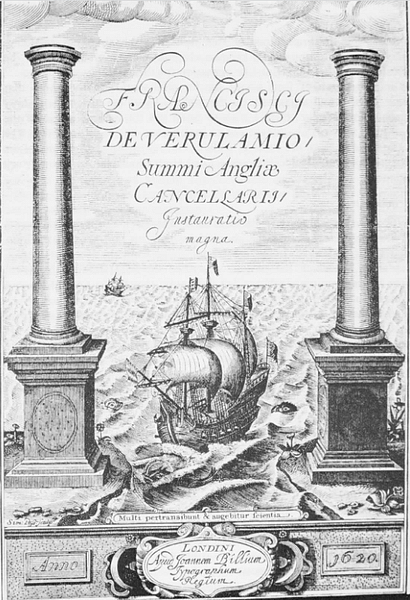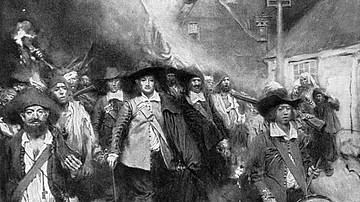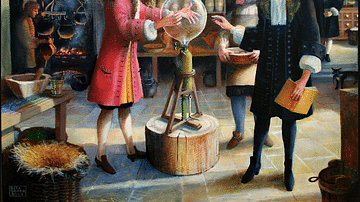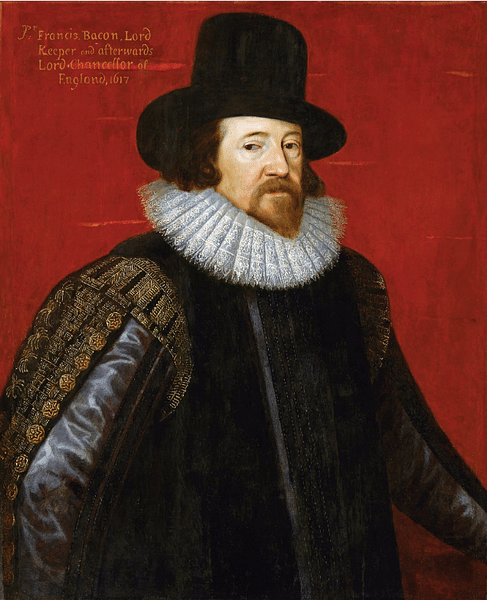
Francis Bacon (1561-1626) was an English philosopher, statesman, and author. Bacon is often considered one of the founders of modern scientific research and scientific method, even as "the father of modern science" since he proposed a new combined method of empirical experimentation and shared data collection so that humanity might finally discover all of nature's secrets and improve itself.
Political Career
Francis Bacon was born on 22 January 1561 in London. His family had powerful connections, his uncle, for example, was William Cecil, Lord Burghley (l. 1520-1598), special advisor and personal secretary to Elizabeth I of England (r. 1558-1603) from 1558 to 1572. Lord Burghley also served as Lord Treasurer from 1572 to 1598. Bacon joined the University of Cambridge in 1573 where he studied law. Completing his studies in law at London's Inns of Court, Bacon joined the English embassy in France, a post he held until 1584.
Returning to England, Bacon began a career in politics, which would see him reach the very top of what could be a highly dangerous tree, one particularly susceptible to brutal pruning by unpredictable absolute monarchs. Alexander Pope, known for his sharp humour, once described Bacon as "the wisest, brightest, and meanest of mankind" (Rundle, 31). Bacon was elected a member of Parliament in 1584. His uncle's patronage failed to secure Bacon the position of Attorney-General in 1594 and 1596. Perhaps Burghley pushed too hard for his nephew since, in the end, the queen stated she would appoint anyone except Bacon to the post.
In 1596, Queen Elizabeth did appoint Bacon to the Queen's Counsel. Bacon ultimately deserted his famous uncle and sided with Burghley's great enemy, Robert Devereux, Earl of Essex (1566-1601). This was an unfortunate choice of ally since Essex soon found himself in disgrace. Fortunately, Bacon redeemed himself somewhat by helping to secure Essex's execution in 1601 and then justifying his political machinations in his Apology of 1604, where he explained that his ultimate loyalties lay neither with Burghley nor Essex but belonged, rather, to his monarch.
In 1603, Bacon was knighted by the new monarch, James I of England (r. 1603-1625). More extravagant titles followed, that of 1st Baron Verulam in 1618 and Viscount St. Albans in 1621. In 1618, the same king appointed Bacon Lord Chancellor, but he did not hold the position for long since allegations of corruption soon surfaced. Bacon admitted his guilt, was held in the Tower of London for four nights, and suffered a whopping fine of £40,000 (£8 million today). Fortunately, King James cancelled the fine, but with his political career in tatters, Bacon concentrated on his more academic pursuits. In these, he would be remarkably successful and influential, all the more surprising since he did not himself seriously practice any branch of science.
Bacon's New Scientific Method
Bacon set out his thoughts on what he considered a proper scientific method in his The Advancement of Learning, first published in 1605. In Novum Organum (New Organon), published in 1620, Bacon further outlined what he thought was the correct approach to understanding the natural sciences. In these two works, Bacon championed the need for detailed empirical study, as this was the only way to increase humanity's understanding and, for him, more importantly, gain control of nature. This approach sounds quite obvious today, but at the time, the shadow of Aristotle (l. 384-322 BCE), the great ancient Greek philosopher, still loomed large over early modern minds. The Aristotelian approach to scientific inquiry, what Bacon called the traditional organum, had become highly theoretical, so much so that subjective verbal arguments held sway over practical experimentation. Such verbal arguments were additionally made useless because they used imprecise terminology which few could agree on. Further, natural philosophers had become preoccupied with why things happen instead of first ascertaining what was happening in nature, so said Bacon. Francis Bacon is sometimes held as a supporter of alchemy, but apart from admiring the passion of alchemists for endless experimentation, he had no time for these pseudo-chemists either. He composed this picturesque damnation of both philosophers and alchemists:
All the philosophy of nature which is now received, is either the philosophy of the Grecians, or that other of the alchemists…The one is gathered out of a few vulgar observations, and the other out of a few experiments of a furnace. The one never faileth to multiply words, and the other ever faileth to multiply gold.
(Gleick, 52)
Bacon believed in the idea of progress – his personal motto was plus ultra or 'further beyond' – and he thought that his contemporaries were not so concerned with bettering the human condition because they were bewitched by the achievements of the past. Bacon observed that the traditional limits of the ancient Mediterranean, the Pillars of Hercules, had long been left behind as mariners like Christopher Columbus (1451-1506), Ferdinand Magellan (c. 1480-1521), and Vasco da Gama (c. 1469-1524) had explored the globe. The marine compass and gunpowder, amongst several other key inventions, had revolutionised travel and warfare. Bacon considered these developments to have happened by chance, and so he yearned for a more systematic approach to acquiring knowledge. He imagined how much more might be achieved if thinkers devoted themselves to a new approach. Consequently, Bacon, who specifically compared himself to the pioneering Columbus, proposed a new system of inquiry, what he termed a novum organum, hence the title of his book. This approach would, Bacon argued, help build an entirely new institution of science (what in those days might better be termed natural philosophy). Bacon called this new objective his Instauratio Scientiarum or great scientific founding. All of this was not exactly new as other thinkers had thought along the same lines, but Bacon's unique contribution was to set about creating an almost coherent package of these ideas (he ran out of time and died before his great project was complete). Bacon's approach had three essential steps.
1. Assessing Existing Knowledge
Not content with setting out how others should approach science, Bacon was intent on building this new edifice of knowledge himself or, at least, making excellent progress on its foundations. To start with, though, Bacon was less interested in new knowledge and more focused on surveying all existing knowledge. The fruit of this initial endeavour was his The Advancement of Learning. Bacon did not believe all past research, ideas, and received wisdoms were still valid, and a lot of dead wood had to be chopped from humanity's tree of knowledge.
2. Experiments, Tests, & Data Collection
In a second step, Bacon set out his new scientific method so that others would follow suit and the existing, suitably pruned knowledge tree might grow new and impressive branches. This approach is explained in his Novum Organum. Bacon summarised the approach as going out into the field and thoroughly testing nature without any preconceived ideas. Nature had to be put "under constraint and vexed; that is to say, when by art and the hand of man she is forced out of her natural state, and squeezed and moulded" (Moran, 133). In this method of experimentation, facts and data should be observed and gathered so that there was "a lawful marriage between the empirical and rational faculty" (ibid).
Bacon acknowledges that testing nature is not easy and a wise scientist should hone their skills on easier problems before moving on to more complex truths. Nevertheless, Bacon also believed that great thinkers were not necessarily essential to making leaps in knowledge since any person with hands and eyes could conduct experiments and collect data. Further, this data should be openly shared with others conducting similar experiments and the collated results then be systematically presented, for example, in the form of tables. Above all, and unlike the Aristotelians, for Bacon – and we should perhaps remember he first studied law where facts reign supreme – observation and measurements should come first, theories second. Some have criticised this position since the Baconian method or Baconianism (as this approach to knowledge is sometimes termed) minimises the use of hypotheses, which can in themselves be very useful, particularly when mathematics is involved, an area of study Bacon woefully neglected.
3. A New World
As a third step, Bacon believed that science should offer practical improvements to daily life and give humanity power over nature. More traditional approaches, he said, had neglected this crucial aspect of knowledge: making the results of research relevant to ordinary lives. Bacon set out what his new approach might achieve, that is, what our expanded tree of knowledge would actually look like. He did this in his New Atlantis, published posthumously in 1626. Bacon describes a utopian commonwealth based on an island called Bensalem. Here, there is a great and state-sponsored institution of learning, Salomon's House (named after wise King Solomon of the Bible). Scientific investigators gather data, and philosophers analyse these results so that "human life be endowed with new discoveries and powers" (quoted in Burns, 27). Thus, on mythical Bensalem, science is able to provide many new technologies, including, for example, a form of telephone. Bacon was still working on his Instauratio Scientiarum at his death, writing a treatment of natural history, titled Sylva Sylvarum, which he never completed.
Bacon's Major Works
The most famous works by Sir Francis Bacon include:
Essays (1597, revised in 1612 and again in 1625)
The Advancement of Learning (1605)
Of the Wisdom of the Ancients (1609)
Novum Organum (1620)
De Dignitate et Augmentis Scientiarum (an expansion of The Advancement of Learning, 1623)
New Atlantis (1626)
Sylva Sylvarum (1627)
Death & Legacy
Bacon seems to not have enjoyed robust health, and he was famously the patient of William Harvey (1578-1657), who discovered the circulation of the blood in humans. Bacon most likely sought Harvey's advice for curing his chronic gout. The pair did not get on; Harvey once described Bacon's eyes as being like a viper's and dismissed his philosophy as nonsense. Bacon was quite willing to take non-expert advice when it came to his health, indeed, he had singled out professional medical practitioners in his The Advancement of Learning as being particularly susceptible to blindly accepting received wisdom regarding remedies instead of seeing if they actually worked on their patients. Bacon frequently took opium-related drugs, and every week, he indulged in a rhubarb purge. Perhaps he grew his own rhubarb since Bacon was a keen gardener, delighting in strong-scented herbs and flowers and growing his own exotic fruits like pineapples.
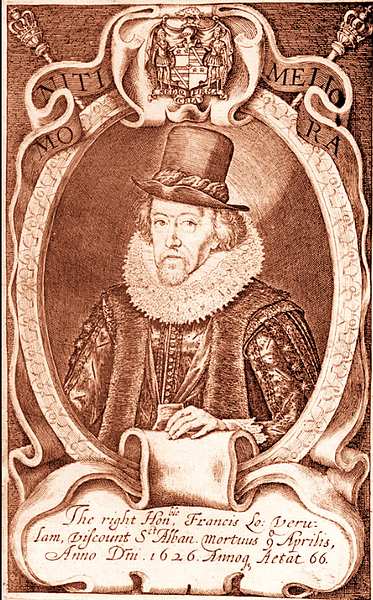
Ever the practical scientist, Bacon died in a somewhat bizarre manner on 9 April 1626. The great man was out in the winter fields stuffing a goose with snow, presumably to determine the efficacy of a novel method of refrigeration, and he caught what turned out to be a heavy and fatal cold. Bacon's philosophy took a while to grab anyone's attention, but by the mid-17th century, his work suddenly became influential.
Bacon had possessed such a luminous mind and was so revered as one of the great thinkers of the 17th century that all sorts of weird and wonderful theories sprang up concerning him in subsequent centuries. The most infamous of these, the Baconian theory, which began to circulate in 1785, is that Bacon was really William Shakespeare, a claim dismissed by serious historians.
It is his approach to science that really ensured Bacon's work lived on. Bacon's ideal of an institution that brought together great minds and promoted scientific research, his Salomon's House in New Atlantis, became a reality with the foundation of the Royal Society in London in 1662. The founding fellows of this society certainly credited Bacon with the idea, and they were keen to follow his principles of scientific method and his emphasis on sharing and communicating scientific data and results. Into this learned society's midst sprang Isaac Newton (1642-1727), who ultimately became a long-serving president. Newton was perhaps the greatest of all scientists. He took Bacon's approach, threw in mathematics, and came up with laws of nature like his universal law of gravity. Bacon would have admired Newton's laws since they sought to explain observable phenomena but not waste time speculating on the unknowable, that is, why they were there in the first place. Laws are not causes; they are descriptions that can be used to explain and predict phenomena. With Newton's work, science, as Bacon had envisaged it half a century before, was finally born.

